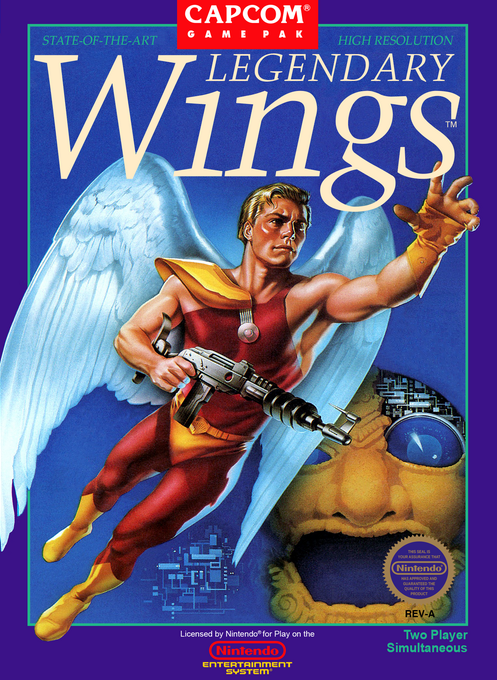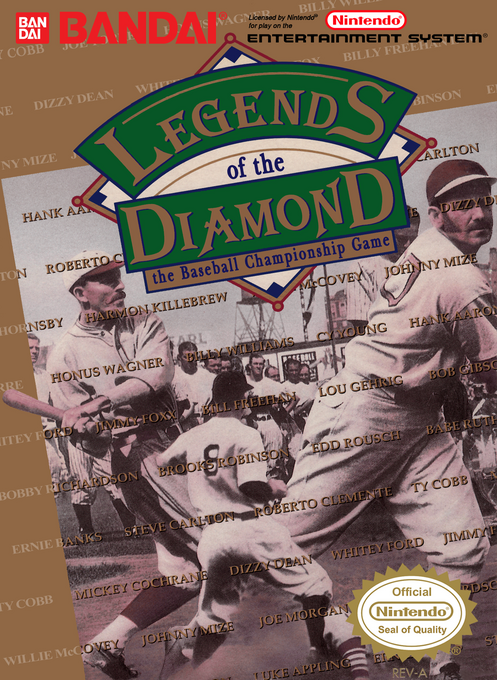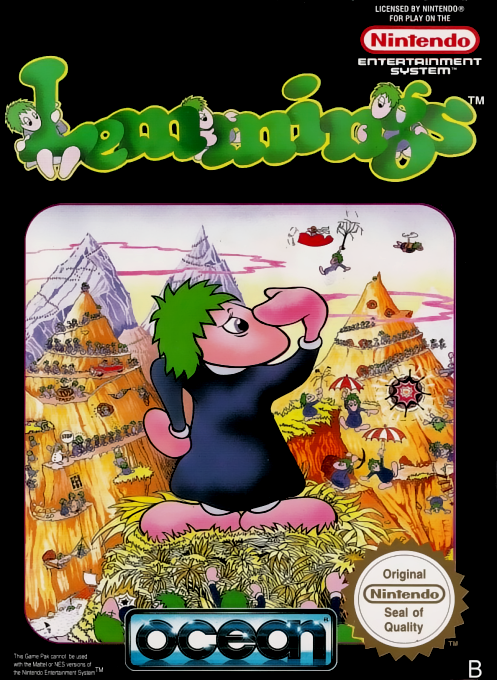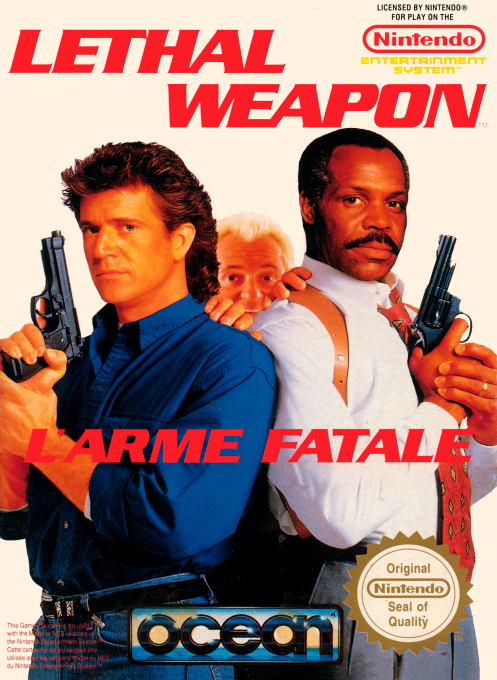Five games, five winners—NES A-Z Episode 94 delivers an unprecedented (maybe I can’t remember and didn’t check) clean sweep that showcases the library’s incredible range. From Capcom’s arcade-perfect shooters to modern homebrew RPGs, from beloved puzzle classics to surprisingly solid licensed beat-em-ups, this batch proves that quality transcends genre. What makes this episode particularly special is the discovery of multiple hidden gems alongside established favorites, demonstrating that even deep into the L’s, the NES still has secrets to reveal and classics to celebrate.
Legendary Wings – 1/1
| Genre | Release | Developer | Publisher |
| Vertical Shmup | 1988 | Capcom | Capcom |
Capcom’s 1988 arcade port delivers vertical scrolling shoot-em-up action with innovative twists that elevate it above standard genre fare. Developed and published by Capcom (maintaining their impressive 14-1 record at this point), the game tasks players with piloting winged warriors through enemy-filled skies while switching between air-to-air shooting and ground-bombing mechanics.
What sets Legendary Wings apart is its emphasis on dodging: “Not everything is shootable… it’s a dexterity check” rather than pure pattern memorization. The game features memorable enemy designs including invincible soldiers that must be avoided, dragons breathing fire, and particularly notable “owls sitting on ice cream cones” (dubbed “Owl Scream” during gameplay).
The variety extends beyond combat—ground targets require different weapons, power-ups provide satisfying upgrades, and the pacing rewards repeated plays rather than punishing players with invisible cheap deaths. As noted during the session, “It was challenging but didn’t feel unfair,” a stark contrast to the recent Last Starfighter disaster. The arcade-quality graphics and smooth scrolling showcase Capcom’s technical prowess, while the unpredictable enemy behavior keeps players engaged.
This represents Capcom firing on all cylinders during their late-80s golden age, delivering exactly the kind of polished arcade experience NES owners craved. Final rating: 1/1.
Legends of Owlia – 1/1
| Genre | Release | Developer | Publisher |
| Action RPG | 2016 | Gradual Games | Gradual Games |
Gradual Games’ 2016 homebrew RPG exemplifies why modern fan-created titles consistently impress: “They’re always passion projects and they’re not out to make a profit.”
This top-down action-adventure features an elf protagonist accompanied by an owl companion that serves as both tool and weapon through a unique command system. Players can switch between two owl techniques (so far!)—”Fetch” for retrieving distant objects and “Rush” for attacking enemies—creating puzzle-solving and combat opportunities that feel fresh despite obvious Legend of Zelda inspiration.
The game opens in a falconry school tutorial that elegantly teaches mechanics: your owl can learn multiple techniques, and you select which pair to have active at any time. The presentation impresses with smooth animations, thoughtful UI touches (like “gentle little leaves on top of the inventory screen”), and a password save system. Combat feels satisfying whether using your dagger or commanding your owl, while exploration promises secrets and progression typical of the genre’s best entries.
The result is a polished experience that “deserves more than 5 minutes for a full assessment” but clearly earns its score even on first impression. Final rating: 1/1, with strong recommendation for extended play.
Legends of the Diamond – 1/1
| Genre | Release | Developer | Publisher |
| Baseball | 1992 | Tose | Bandai |
Bandai’s 1992 baseball simulation proves that sports games can transcend their genre limitations through strong presentation and solid mechanics. Despite the my admitted dislike of baseball, the game delivers surprising enjoyment through intuitive controls and engaging gameplay.
The opening cinematic impresses with quality animation, while character selection includes cheerleaders and field choices that add personality. Gameplay captures baseball’s essentials—pitching, hitting, fielding—with responsive controls that make both offense and defense satisfying. The throwing animations feel snappy, hits produce visible trajectory indicators, and defensive plays require quick reactions. Some mechanics remain mysterious (base stealing proved elusive during the session), but the core loop works: “I’ve definitely had less fun playing a baseball game.”
The presentation shines with detailed player sprites, smooth animations, and clear UI elements that communicate game state effectively. Unlike many sports titles that feel like homework, Legends of the Diamond maintains a “video game enjoyment experience regardless of it being this sport that we have little to nothing about.” The game never claims to be a hidden gem or transcendent experience, but it accomplishes something perhaps more impressive: making baseball fun for people who don’t care about baseball.
As concluded, “Don’t let it be said that I’m automatically always giving sports games a zero.” Final rating: 1/1.
Lemmings – 1/1
| Genre | Release | Developer | Publisher |
| Puzzle | 1991 | Psygnosis (Ported by Ocean) | Sunsoft |
Psygnosis’ classic puzzle-platformer receives an excellent NES port courtesy of Ocean/Sunsoft’s 1991 adaptation. The game’s premise remains brilliantly simple: guide suicidal lemmings from entrance to exit by assigning specialized roles—diggers, climbers, blockers, umbrella carriers—to overcome environmental obstacles.
The NES version impresses immediately with smooth animation: “Look at all those frames” of movement as lemmings march, fall, and perform their assigned tasks. The cursor-based interface translates surprisingly well to controller input, maintaining the precision needed for tricky puzzles while keeping pace manageable (“the cursor speed is nice, not too slow”).
Level design introduces mechanics gradually, starting with simple “Just Dig” stages before layering in multiple job types and complex spatial reasoning. The game’s dark humor—lemmings blindly marching to their doom, the nuclear option that explodes all remaining creatures—provides personality without undermining the puzzle challenge. Technical execution deserves praise: this could have been a disaster, translating mouse-driven PC gameplay to d-pad control, but instead creates a “really good version of the game” that maintains the franchise’s excellence.
Having played the Amiga original provides context for appreciating how well the NES port preserves the experience while adapting to hardware limitations. The verdict reflects both the source material’s strength and the port’s quality. Final rating: 1/1, with recognition that Ocean successfully ported a gaming classic without compromising its core appeal.
Lethal Weapon – 1/1
| Genre | Release | Developer | Publisher |
| Beat’em Up | 1992 | Eurocom | Ocean |
Ocean’s 1992 beat-em-up adaptation of the action film franchise delivers surprising quality despite the licensed-game stigma. Developed by Eurocom and published by Ocean (bringing their record to 6-4 with Lemmings), the game casts players as Mel Gibson’s character battling through side-scrolling stages filled with paramilitary enemies.
Combat emphasizes melee attacks—particularly a devastating kick that instant kills enemies—while also incorporating limited-ammo firearms and throwable grenades. The gameplay evokes Double Dragon comparisons but adds unique elements: climbing on top of vehicles, destructible crates concealing power-ups, and helicopter battles requiring creative tactics.
Level design provides variety through different environments and enemy types including knife-wielders, grenadiers, and martial artists. The controls feel responsive, with select button switching between melee and ranged attacks, while health restoration items appear frequently enough to encourage aggressive play. One notable absence: Danny Glover’s character doesn’t appear in stage two despite hopes for alternating protagonists, though the game maintains entertainment value regardless.
The experience captures “macho kid wish fulfillment” through one-man-army power fantasy while maintaining challenge through enemy variety and environmental hazards. As summarized, the game is “Double Dragon with a gun” that succeeds through solid fundamentals: “Controls good. Plays cool.” Final rating: 1/1, contributing to Ocean’s redemption arc and the episode’s perfect streak.














Leave a Reply
Want to join the discussion?Feel free to contribute!